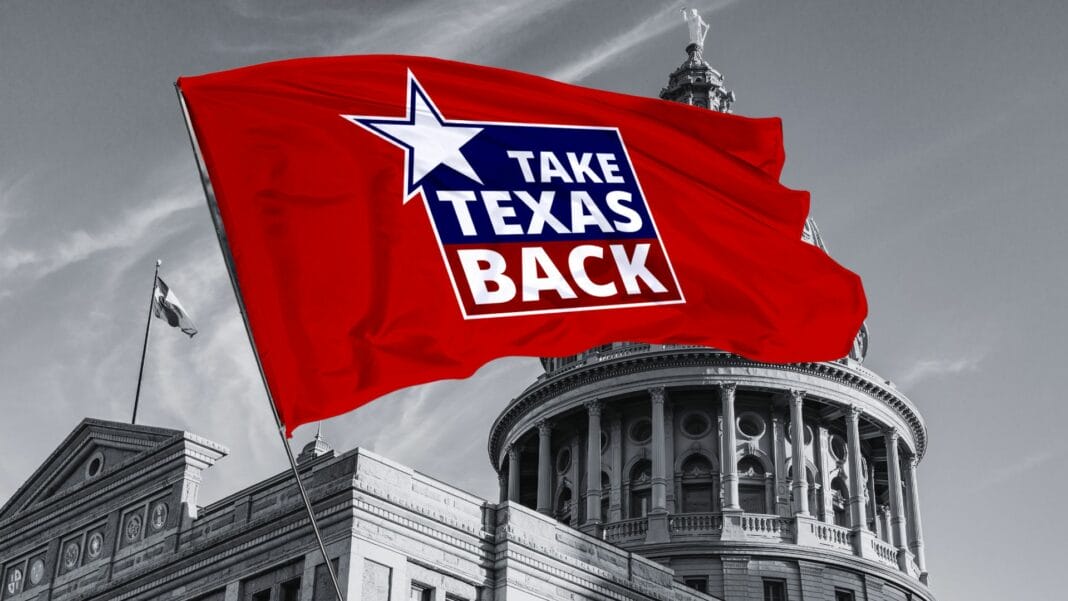September 3rd marks five years since the Texas Nationalist Movement launched the Texas First Pledge, a political commitment that has fundamentally altered the landscape of Texas politics. What began as part of TNM’s “Take Texas Back” campaign has become the most effective litmus test for candidates seeking to demonstrate their commitment to Texas sovereignty.
The pledge requires candidates and officials to prioritize Texas interests above federal mandates, uphold Article 1, Section 2 of the Texas Constitution regarding the people’s right to alter their government, support a referendum on Texas independence, and facilitate separation if voters approve it. Unlike ceremonial political pledges, this commitment is backed by the TNM PAC, which actively supports signers in elections and holds them accountable for their promises.
Electoral Success Validates Strategy
The 2024 election cycle demonstrated the pledge’s growing political influence. Over 190 Texans have signed the commitment, with signers achieving remarkable success at the ballot box, particularly in Republican primaries where base voters determine outcomes.
At least ten new Texas House members committed to TEXIT legislation won their seats in 2024. These victories weren’t concentrated in a single region but spread across the state, suggesting broad-based support for the independence message.
Notable primary victories included Shelley Luther defeating an incumbent in House District 62, Mitch Little ousting an incumbent in District 65, and Wesley Virdell knocking out an incumbent in District 53. Andy Hopper won a runoff against an incumbent in District 64, while David Lowe defeated an incumbent in a runoff for District 91. These weren’t narrow victories by unknown candidates — they represented decisive rejections of establishment Republicans by their own voters.
The pledge’s influence extended beyond individual races to party leadership positions. Abraham George and D’rinda Randall, both pledge signers, were elected as Chair and Vice Chair of the Republican Party of Texas in May 2024. Allen West captured the Dallas County GOP Chair position, while other signers won county party leadership roles across the state.
Mainstreaming Independence Politics
Perhaps the most significant development has been the pledge’s role in normalizing discussions of Texas independence within mainstream Republican politics. Agriculture Commissioner Sid Miller, the only statewide elected official to sign the pledge, is a clear representation of this shift from fringe activism to establishment acceptance.
The pledge has accelerated something that decades of political activism set the stage for: it’s mainstreamed the conversation about Texas independence,” said TNM President Daniel Miller. “Five years ago, politicians would run from any discussion of Texit. Today, they’re signing pledges to support it.”
The commitment has created a clear dividing line in Texas Republican politics between those willing to prioritize state sovereignty and those maintaining allegiance to federal authority. This binary choice has proven politically powerful, forcing candidates to take definitive positions rather than offering vague promises about “fighting Washington.”
Establishment Resistance and Media Criticism
The pledge has faced predictable opposition from establishment Republicans and criticism from mainstream media outlets, who have characterized it as divisive and extremist. However, electoral results suggest Texas voters, particularly in Republican primaries, view the commitment differently.
The success of pledge signers in traditionally conservative districts demonstrates that sovereignty messaging resonates with the Republican base. In district after district, voters chose candidates committed to Texas independence over incumbents with longer resumes and establishment backing.
This pattern has created anxiety within the Republican establishment, as career politicians struggle to explain why they won’t commit to prioritizing Texas interests. The pledge’s straightforward language makes evasion difficult, forcing politicians to either embrace Texas sovereignty or acknowledge their preference for federal authority.
Building Long-Term Infrastructure
While the 2025 legislative session concluded without the filing of independence referendum legislation, the growing number of pledge signers represents significant progress in building the political infrastructure necessary for future efforts. The presence of committed sovereignty supporters throughout Texas government creates a foundation that didn’t exist five years ago.
The pledge signers who won election in 2024 bring fresh perspectives to Austin, unencumbered by decades of relationships with the establishment political machine. Their willingness to challenge incumbents in primaries demonstrates a commitment to principles over political convenience — exactly the kind of resolve needed to advance independence legislation in future sessions.
TNM has consistently advocated for giving Texans a direct vote on independence, arguing that Article 1, Section 2 of the Texas Constitution guarantees this right. The electoral success of pledge signers suggests growing grassroots support for this position, even if legislative leadership remains resistant.
Local and Regional Impact
The pledge also influences electoral dynamics beyond the Legislature. Local officials, county commissioners, constables, and party chairs who have signed the commitment create a network of sovereignty supporters throughout Texas government. This grassroots infrastructure proves valuable in educating voters about independence issues and building support for future campaigns.
County party leadership positions held by pledge signers provide platforms for advancing sovereignty messaging within Republican circles. When local GOP chairs support Texas independence, it signals to voters that these positions represent mainstream conservative thought rather than fringe activism.
Broader Political Implications
The Texas First Pledge represents more than support for independence — it reflects growing frustration with federal overreach on issues ranging from border security to economic regulation. Many signers cite specific grievances with federal policies that ignore Texas needs and interests.
Border security has emerged as a particularly powerful issue for pledge supporters, with federal immigration policies creating significant costs for Texas taxpayers while failing to address security concerns. The pledge allows candidates to connect sovereignty arguments to immediate policy grievances, making independence seem practical rather than theoretical.
The commitment also appeals to voters frustrated with establishment politicians who campaign on conservative principles but govern differently in Austin or Washington. By requiring specific commitments to Texas sovereignty, the pledge creates accountability mechanisms that traditional campaign promises lack.
Looking Toward Future Cycles
The establishment Republican response to pledge signers bears watching as the 2026 election cycle approaches. Some incumbents have begun adopting tougher rhetoric on federal overreach while stopping short of supporting independence votes. This rhetorical shift suggests the pledge is influencing broader political discourse, even among non-signers.
The success of pledge signers in 2024 provides a roadmap for future electoral strategies. Candidates who embrace Texas sovereignty messaging and demonstrate a genuine commitment to independence principles can defeat well-funded incumbents, particularly in Republican primaries where base voters determine outcomes.
Future legislative sessions will test whether the growing number of pledge signers can advance concrete legislation on independence referendums. The political calculus continues to shift as more sovereignty supporters win elections to state and local offices.
Five Years of Progress
What seems certain is that five years after its launch, the Texas First Pledge has accomplished its primary objective: forcing Texas politicians to choose between state sovereignty and federal allegiance. That binary choice has reshaped political competition across the state and elevated independence from fringe activism to mainstream Republican discourse.
The pledge has created a new category of Texas politician — one willing to publicly commit to prioritizing state interests over federal demands. These commitments carry political weight because they’re backed by electoral consequences, making them more meaningful than traditional campaign rhetoric.
The establishment didn’t anticipate how quickly sovereignty messaging would resonate with Texas voters, and their delayed response has allowed pledge supporters to build significant momentum. Career politicians who assumed independence talk would remain on the political margins now find themselves defending their reluctance to prioritize Texas interests.
For Texas Nationalists, five years represents substantial political progress. The pledge has mainstreamed independence discussions, elected committed supporters to office, and created accountability mechanisms for politicians who claim to represent Texas interests. While legislative victories remain elusive, the foundation for future success continues to strengthen with each election cycle.
The Texas First Pledge proves that when given clear choices, Texas voters consistently choose sovereignty over subservience. That lesson will guide independence efforts for years to come.


